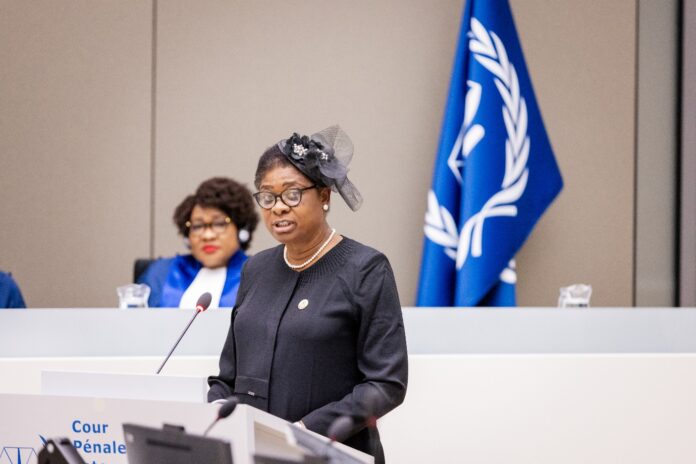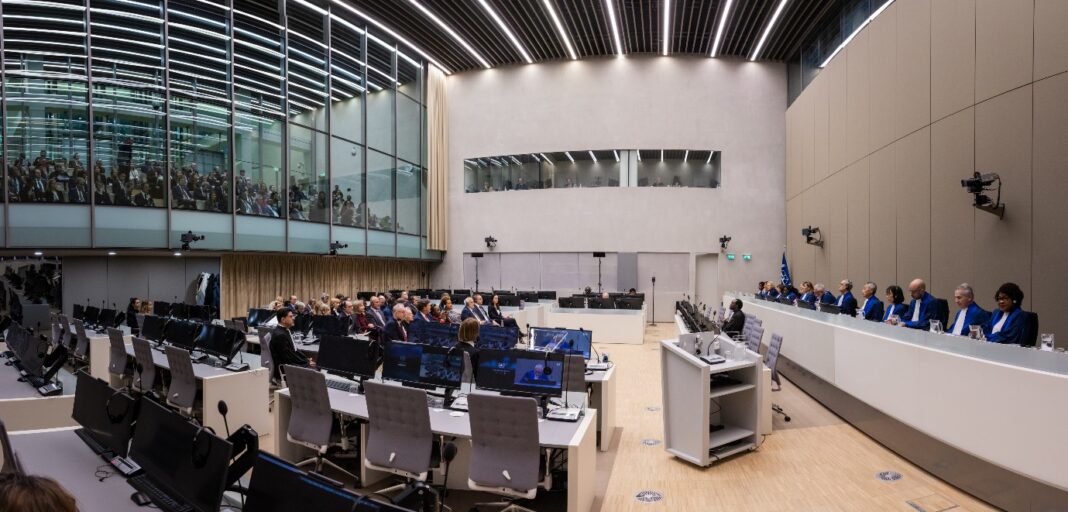On 19 January 2024, the International Criminal Court held a solemn hearing for the opening of its judicial year, featuring speeches of this year’s keynote speaker, Honorable Lady Justice Stella Isibhakhomen Anukam, Judge of the African Court on Human and Peoples’ Rights, ICC Principals, and the President of the ICC Bar Association. ICC judges as well as the Vice-President of the Assembly of States Parties (ASP), Ambassador Margareta Kassangana, Representatives from national jurisdictions, regional or international courts, the diplomatic corps, civil society and international organizations, also attended the event in ICC Courtroom 1 or through the online streaming.
The President of the ICC, Judge Piotr Hofmański, stated: “2023 was an extremely intense year for the ICC, both as regards judicial proceedings as well as investigations and reparations. This heavy workload will continue in 2024. What we would hope to see, of course, is more suspects in custody. We need States to step up their efforts to execute the outstanding arrest warrants.”

Honorable Lady Justice Stella Isibhakhomen Anukam, Judge of the African Court on Human and Peoples’ Rights, delivered a keynote address on the role of judicial institutions in pursuing sustainable peace, security and development and stated: “The strengthening of judicial institutions plays a key role in the restoration and consolidation of peace by facilitating the maintenance of law and order and fostering the peaceful resolution of disputes. … By holding the perpetrators accountable, the ICC ensures that justice is served, and prevents further crimes from occurring, hence contributing to sustainable peace, security and development. ”
ICC Registrar Osvaldo Zavala Giler said: ”Looking forward to the year ahead, we find ourselves in the midst of a paradigm shift, where the demands for justice test the capacities of the international community to adequately address them. The Court’s operational landscape is undergoing a drastic expansion, reaching across five continents. Simultaneously, we are confronted with unprecedented security challenges that threaten the very essence of our institution. Security serves as a crucial precondition for the success of our operations, whilst also forming the foundation for judicial and prosecutorial independence, therefore placing it at the heart of the Court’s legitimacy.”
The President of the International Criminal Court Bar Association (ICCBA) Marie-Hélène Proulx stated: “In a world that may seem more uncertain and dangerous with each passing day, justice must remain our guiding light. And for the rule of law to thrive, we need fearless lawyers. We need advocates who will represent victims with heart and soul, lawyers who will defend their clients tooth and nail, independent of prejudice and public opinion. We need lawyers who are not afraid to do the right thing, even when it is unpopular, controversial, or difficult. ICC external counsel and their teams are made of that cloth, and the ICCBA is proud to represent them and advocate for them.”
The solemn hearing was followed by the ICC’s Sixth Annual Judicial Seminar attended by ICC judges and more than 40 judges from international, regional and national courts, including several chief justices of ICC States Parties , held both online and at the seat of the Court. This year’s Seminar will focus on the role and the rights of victims in the context of judicial responses to international crimes, at the ICC as well as in other jurisdictions, notably national and regional courts. A summary report of the Judicial Seminar, held under Chatham House rules, will be issued subsequently. The ICC is grateful to the European Union for the funding provided for the Judicial Seminar.



